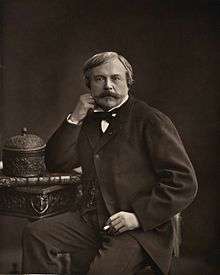Edmond de Goncourt
Edmond Louis Antoine Huot de Goncourt (pronounced [ɛdmɔ̃ də ɡɔ̃kuʁ]; 26 May 1822 – 16 July 1896) was a French writer, literary critic, art critic, book publisher and the founder of the Académie Goncourt.[1]

| French literature |
|---|
| by category |
| French literary history |
| French writers |
|
| Portals |
|
Biography
Goncourt was born in Nancy. For much of his life, he collaborated with his brother Jules creating works of art criticism, a notorious journal, and subsequently several novels. He was known to be fascinated with Rococo and Japanese art.[2] He also collected rare books, including a copy of Pierre Rameau's 1725 Abbregé de la nouvelle Methode, dans L'Art D’écrire ou De Tracer toutes sortes de Danses de Ville (New Abridged Method for writing or tracing all sorts of country dances).[3] After the death of Jules he continued to write novels alone.
He bequeathed his entire estate for the foundation and maintenance of the Académie Goncourt. In honour of his brother and collaborator, Jules de Goncourt (17 December 1830 – 20 June 1870), each December since 1903, the Académie awards the Prix Goncourt. It is the most prestigious prize in French language literature, given to "the best imaginary prose work of the year".
Marcel Proust, Simone de Beauvoir, Michel Tournier, Marguerite Duras, Romain Gary (who exceptionally won it twice) and Nobel Prize Patrick Modiano are among the best-known authors who have won the century-old prize.
Edmond de Goncourt died in Champrosay in 1896, and was interred in the Cimetière de Montmartre in Paris.
Quotes
- "A painting in a museum hears more ridiculous opinions than anything else in the world."
- "If there is a God, atheism must seem to Him as less of an insult than religion."
- "There are no women of genius; the women of genius are men."[4]
See also
References
- "Goncourt, Edmond de". Sabatier, Pierre. l'Esthétique des Goncourt. Paris: Hachette, 1920; Fosca, François. Edmond et Jules de Goncourt. Paris: A. Michel, 1941; Ironside, Robin. "Introduction." Goncourt, Edmond and Goncourt, Jules. French XVIII Century Painters. London: Phaidon Press, 1948, pp. ix-xi; Baldick, Robert. The Goncourts. London: Bowes & Bowes, 1960; Billy, André. The Goncourt Brothers. New York: Horizon Press, 1960; Bazin, Germain. Histoire de l'histoire de l'art; de Vasari à nos jours. Paris: Albin Michel, 1986 p. 194; Kultermann, Udo. The History of Art History. New York: Abaris, 1993, pp. 148-49; Brookner, Anita. The Genius of the Future: Studies in French Art Criticism (1971). February 21, 2018.
- "Exchange: Portrait of Edmond de Goncourt". exchange.umma.umich.edu. Retrieved 2020-04-08.
- Friderica Derra de Moroda, "Choréographie: The Dance Notation of the Eighteenth Century: Beauchamp or Feuillet?," The Book Collector 16, no. 4 (1967): 459.
- Przekrój Magazine
External links
| Wikimedia Commons has media related to Edmond de Goncourt. |
- Works by Edmond de Goncourt at Project Gutenberg
- Works by Edmond de Goncourt at Faded Page (Canada)
- Works by or about Edmond de Goncourt at Internet Archive
- Blog dedicated to Edmond and Jules de Goncourt
- Newspaper clippings about Edmond de Goncourt in the 20th Century Press Archives of the ZBW
- "Goncourt Brothers and the Taste for the 18th Century" symposium at the Frick Collection, featuring art historians Olivier Berggruen and Yuriko Jackall